What is 16/8 Intermittent Fasting | 8/16 Intermittent Fasting Schedule | Foods during fasting | Benefits | Side Effects
16/8 Intermittent Fasting is the quickly becoming the most popular fasting trend. Whether you are a working professional or a homemaker, 16/8 fasting is simple to adapt and follow and is the primary reason behind its astounding popularity.
Summary of 16/8 Intermittent Fasting
16/8 Intermittent Fasting in a nutshell, is 16 hours of fasting, and 8 hours of eating. This 16/8 fasting schedule is the most common form of fasting, and fits easily into schedule for most people.
As you read on, we explain precisely what 16/8 fasting is and reveal how to execute it correctly. We will recommend the best foods to consume during this fasting plan and round up this post by highlighting the possible health risks involved in a 16/8 fast. We will give you all the information to help you decide if this type of intermittent fasting is right for you. But before we start…..
Many celebrities like Jennifer Aniston, Elon Musk, and Hugh Jackman practiced 16/8 fasting and hugely boasted of the incredible benefits they obtained.

The Benefits of 16/8 Intermittent Fasting:
Weight LossPreventing DiseasesIncreased Life SpanMore EnergyAutophagyImproved sense of well being – overall better health
And much, much more…..
What Exactly Is 16/8 Intermittent Fasting?
16/8 intermittent fasting plan is one of several types of time-constrained fasting. With this type of fast, you will consume food within an 8-hour window, followed by 16 hours of fasting in a day.
You may wonder how anyone could fast for 16 hours a day. Most experts believe that 16/8 fast supports the average person’s natural circadian rhythm or internal clock. Most individuals naturally do not eat in the late hours of the night and the early hours of the morning.
Typically, the average person sleeps 8 to 10 hours daily, so you already have between 8 to 10 hours of fasting just from sleeping through the night. You can then make up the remaining 6 to 8 hours during the day, which can be a few hours in the morning and, if you like, in the evening, depending on your preference.
In either case, you will spend your mid-day consuming the required calories to help you sail through the day, staying active. Your 16/8 intermittent fasting meal plan can be as flexible as you want, as there are no limits to the quantity or the type of food you can consume within the 8 hours eating window.
This Chart shows the 16/8 Intermittent Fasting Schedule:
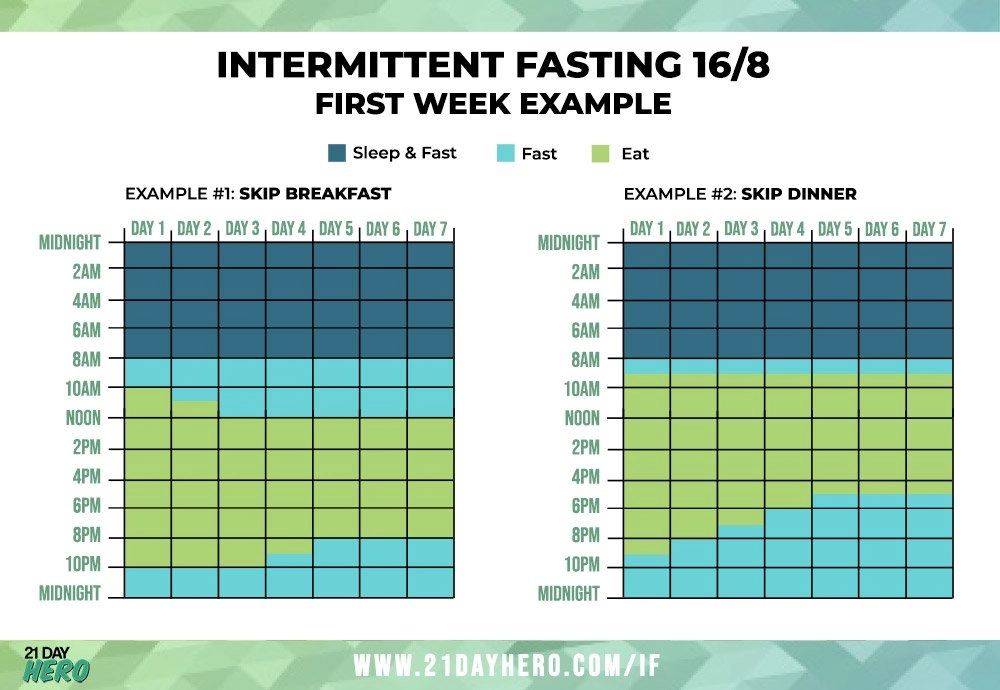
16/8 Intermittent Fasting To Suit Your Lifestyle
Now that you have a fair idea of what a 16/8 fast is, let us go a little deeper into knowing the intermittent fasting schedule 16/8. So, you already fast for about 8 to 10 hours every day while you sleep. It is now left for you to decide which part of the morning, day, or evening to make up the remainder of the 16 hour fast schedule.
Some leading proponents of this type of intermittent fasting suggest that it is best to conclude your food consumption by evening because this is when your rate of metabolism is slower. However, not everyone may be comfortable ending their meals early in the evening.
Many people have dinner at around 7 PM, while others may eat later due to their work schedules. Whatever your reason for eating late into the night, you should always avoid consuming food for at least 2 hours before bedtime. You can choose your 8-hour feeding window around these three options below – here are some examples of 16/8 fasting times:
Between 9 AM and 5 PM(or 12- 8pm is the same is OK, any variation of 8 hours works!)Between 10 AM and 6 PMBetween Noon and 8 PM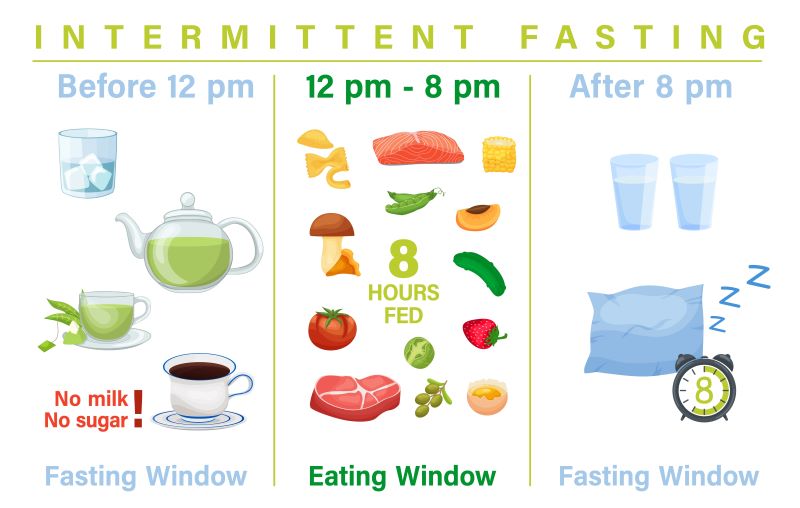
You can choose the 8-hour feeding window that works best for you. Within this time, you can consume nutrient-rich meals and healthy snacks to maintain a steady blood sugar level. The key is to avoid spikes or dips in your blood sugar level to maintain satiety while preventing hunger pangs.
There are several great apps to help you throughout your fasting journey. To help you choose, we’ve written a guide on the top fasting apps with reviews for each: Best Free and Premium Intermittent Fasting Apps.

Foods To Consume During Fasting and Useful Tips
In determining how many calories to eat during intermittent fasting 16/8, you first need to know your body weight in pounds, followed by your macro setup. Your macro setup consists of your daily protein, carbohydrates, and fat intake. Your calorie limit will be dependent on your pound body weight.
You can consult a nutritionist to help determine your exact macro split (i.e., the daily calorie limit for your protein, carbohydrates, and fat consumption). Learn how intermittent fasting works and when the body starts losing fat while fasting.
What is very important for you to consider, though, is that you should focus on eating healthy meals only. Avoid consuming unhealthy, junk, and processed foods, as it might make you gain excessive weight, leading to various health issues.
You should mix up your meals to include the following:
MeatFishEggsVegetablesFruitsSeedsWhole grainNutsOlive oil
You need the minerals and vitamins that fruits and green vegetables can provide, while whole grain offers you fiber that is good for digestion. Also, meat, eggs, and fish provide protein, healthy fats, and oil. Make sure to drink lots of water- between 8 to 12 glasses daily should suffice to help keep you hydrated and aid your digestion.
You can also drink beverages like coffee and tea, but avoid taking them too much, and avoid adding sweeteners that include calories. Stevia is a great alternative to other sweeteners. Your 16 hour fasting diet can include the consumption of cinnamon herbal tea, which is known to help suppress hunger. You might want to avoid watching your favorite food channel on television, as seeing food can trigger your appetite. See Tips on what you can drink while intermittent fasting.
If you wish to do the vegan diet, there is a Vegan Intermittent fasting guide.
Exercise is good, but a workout before your feeding window is advisable, as you are more likely to be hungry after the exercise. Avoid exercising after your 8-hour feeding window. Your fasting period can be best executed if backed with some form of meditation, as this is known to help instill the discipline and focus needed to help you achieve your intermittent fasting objectives.
16 Hour Fast Benefits Revealed & 16/8 fasting results
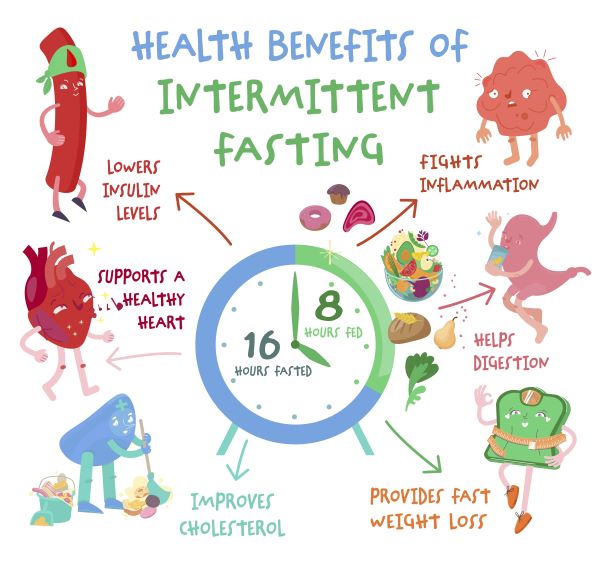
What 16/8 intermittent fasting results are you looking for?
Only you can answer this question.
Before you start any fast, you need to be clear on your goals. These could be physical, psychological, or mental, but whatever your goals are, they should drive you toward completing your fast. 16/8 intermittent fasting has been linked with many health benefits.
Let us go over the benefits of intermittent fasting, starting from the one that is probably the first reason you are scrolling through this article until now.
16/8 Weight Loss
To show you the 16/8 Fasting results, Studies have shown that consuming food within a defined time can reduce calorie intake while boosting your metabolic rate. So 16/8 fasting weight loss is undoubtedly a health benefit worth considering, particularly if you are overweight or obese.
Your 16/8 fasting weight loss results 1 week in, you may find you lose weight pretty quickly as your body adjusts to the new diet. The 16/8 fasting results 1 month in, some people have lost between 5-15 pounds with proper diet, exercise, and nutrition.
Be sure to consult your doctor or nutritionist if this plan would work for you specifically, given your current health condition or if you have any underlying health issues. Your 16/8 fasting weight loss results will vary from person to person.
See these intermittent fasting results.
Improves Heart Health

Intermittent fasting is a calorie restriction diet that reduces body weightand improves various cardiovascular risk factors. It is believed to lower blood pressure, insulin resistance and increase heart rate variability, and improved insulin sensitivity.Studieshave indicated that when the frequency of eating is reduced, it results in better cardiovascular stress adaptation. This lowers cardiovascular risk factors.
Alternate day fasting reduces age-related inflammationand fibrosis. Intermittent fasting guards your heart against ischemic injury and helps in recovering post-myocardial infarction (MI) viaanti-inflammatory mechanisms.
Reduces The Risk Of Type 2 Diabetes
Many health professionals recommend dietary interventions for managing diabetes.
A diet regimen that lowers insulin resistance and blood sugar levels can be beneficial in type 2 diabetes.Intermittent fasting improves morning fasting glucose levelsand reduces postprandial variability.
Intermittent fasting is a simple and accessible nutrition intervention. It results in significant improvements in diabetic glucose control.According to experts, it is a safe and tolerable diet for diabetic patients that results in zero incidences of hypoglycemia. It often leads to weight loss by reducing caloric consumption, which is beneficial for many people with type 2 diabetes.
Preventing Diseases
It is widely believed that 16/8 fasting can help prevent many diseases and health conditions, such as neurodegenerative ailments, cardiovascular health conditions, type 2 diabetes, and certain cancers. There have been several human and animal studies to back these claims.
Also, since intermittent fasting helps regulate your weight, it wards off obesity, which is linked to numerous ailments. You can try intermittent fasting to prevent issues related to menopause. Also, a 16 hour fasting window helps your gut heal, as digesting food puts your system to work during your eating window, so the longer the fasting period the more time your digestive tract can heal.
If you have issues such as Leaky Gut, SIBO (Small intestine bacterial overgrowth), Acid Reflux, Indigestion, or other digestive ailments you may find fasting very helpful.
Improves your Hormone Function
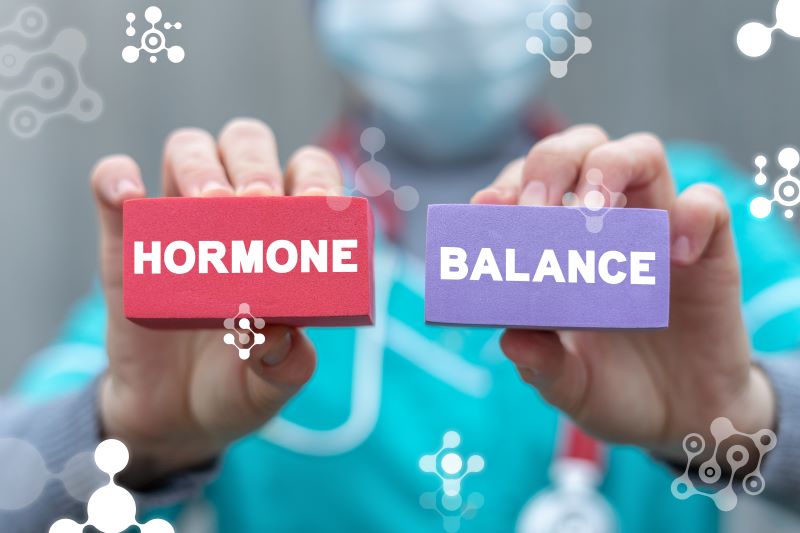
During your fasting period, various changes take place in your body. The changes in hormonal function initiate cellular repair and healing of your body.
Intermittent fasting mainly affects these hormones;
Insulin
One of the mostsignificant benefit of intermittent fasting islowering insulin levels.When you consume food, it increases your calorie levels resulting in the release of insulin. The most effective way of lowering insulin is to avoid food, exactly what intermittent fasting does during the fasting window. Lowered insulin means more fat is burned.
Growth Hormone
Growth hormone enhances the breakdown and utilization of fat byreducing both lipoprotein lipase activity and insulin’s inhibitory action on hormone-sensitive lipase. It also preserves muscle protein, muscle mass, and bone density.
According tostudies,fasting enhances growth hormone secretion, which helps to preserve the muscles as well as burn fat.
Brain-Derived Neurotrophic Factor (BDNF)
Dietary restriction in intermittent fasting decreases energy consumption without compromising any nutritional value. It brings some powerful changes in the metabolic processes of the brain by increasing stress resistance, breaking down fats and ketogenic amino acids. Withneuroprotective effect,BDNF helps in the generation of new nerve cells, enhances cognitive functions and learning. This improved brain function is a huge benefit.
Intermittent fasting increases the production of BDNF,leading to the prevention of dysfunction and dysregulation of neurons.
Triggers Autophagy
Diet interventions promote metabolic and cellular changes resulting in adaptation to periods of limited nutrient availability. This nutrient starvation activatesautophagy. The term “autophagy” means “self-eating,” where damaged and unwanted cells are eaten up by the body.
Autophagyplays a vital role in tumor suppression; hence it is associated with the prevention of cancer. It optimizes your body’s functioning by creating new cells and removing disintegrated ones.
Increased Life Span
Another one of the potential benefits linked with 16/8 intermittent fasting is its ability to increase your lifespan. Studies on lab mice have proven this to be true. However, studies on human subjects are limited, so we may not know for sure.
Nevertheless, since fasting helps to keep you within a healthy body weight and promotes metabolism, it may well prolong your lifespan, as these are two baseline conditions for healthy living.
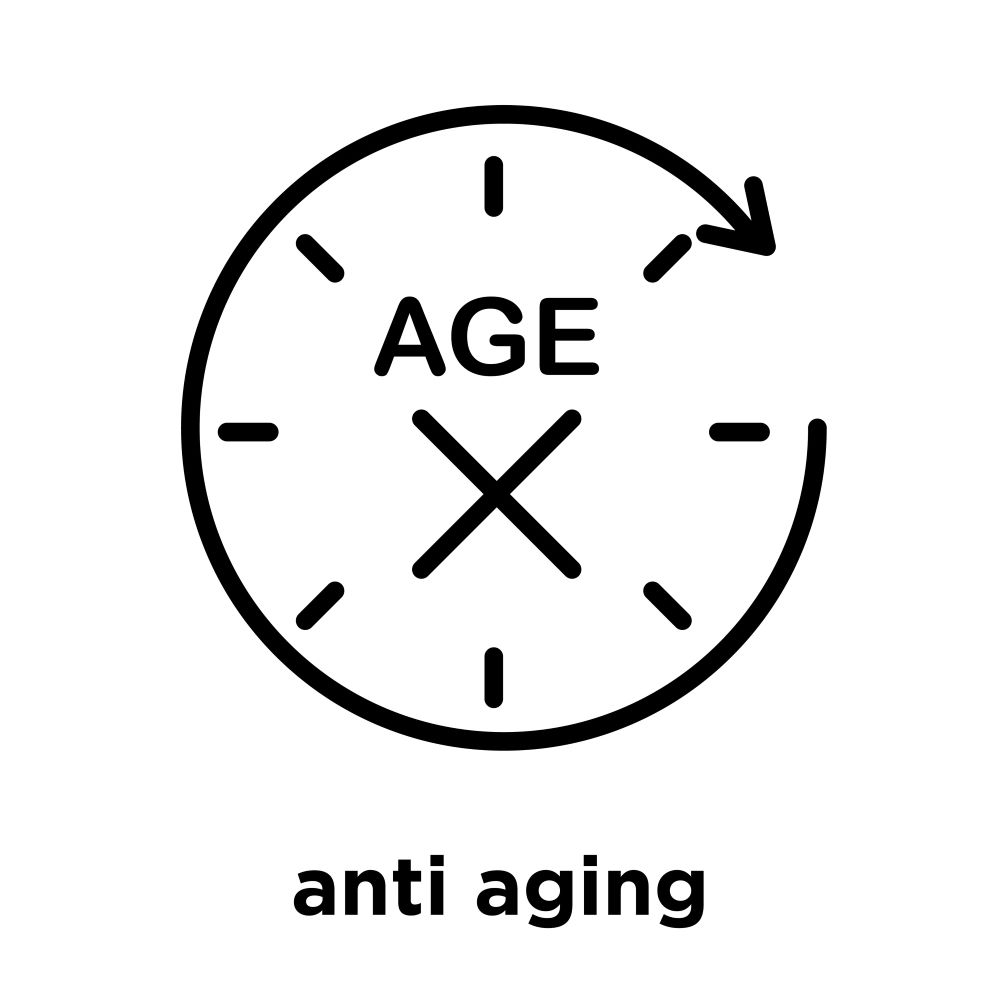
May Prevent Cancer
Periodic fasting has a powerful anti-cancer effect. Cancer cells are vulnerable to nutrient deprivation and are significantly dependent on certain metabolites. Fasting brings alteration in growth factors and metabolite levels. Fasting creates an environment where cancer cells lose their ability to adapt and survive. According toresearch studies, fasting also improves the effects of cancer therapy and reduces the side effects of the treatment.
Glucose is the fuel for most cells, including cancer cells.Fasting leads to aglucose-depleted statethat stops or alters this growth.Intermittent fasting also enhances your immune cells making them more effective against cancer cells.
8. Helps You Sleep Deeper
If you are struggling with sleep issues, eating close to bedtime can be one of the reasons. When you follow a regular eating pattern, your body gets adapted to a consistent sleep schedule. By building a strong circadian rhythm, intermittent fasting helps you sleep better and deeper.
Apilot studyhas revealed that periods of fasting promote sleep quality and reduce nighttime awakening. The study also indicated that fasting increased daytime performance.
Possible Side Effects and Caveats to 16/8 Intermittent Fasting
While you hope for impressive intermittent fasting 16/8 before and after results, you should also consider the possible side effects and health risks and mold your IF routine if you are susceptible to these.
Lethargy: You can feel lethargic, especially when you have just started fasting.Weakness: Intermittent fasting can cause you to feel weak during the fasting window.Hunger: You may feel hungry when fasting, particularly if you have a habit of eating more often.Overeating: You might overeat during the 8-hour feeding window, leading to heartburn or acid reflux.Unhealthy eating: Having junk food during the 8-hour eating window is a risk, as people tend to crave processed foods.Intermittent fasting is not advisable for women trying to conceive, pregnant, or breastfeeding mothers.This fasting form is not advisable for older adults with pre-existing health conditions like high or low blood pressure, diabetes, stroke, heart disease, etc.People with a history of eating disorders are not advised to engage in intermittent fasting.
In Conclusion
This is my personal favorite type of fasting! It fits my schedule perfectly! I can eat breakfast at 10am, and eat my last meal at 6pm, so my work, life and family balance is not negatively impacted by this method. I generally workout in the mornings before my first meal, get home, and eat a high fat and protein meal to supercharge my day!
For the best intermittent fasting 16/8 (8/16 fasting) results, you should decide on which 8-hour feeding timeline is best suited to your lifestyle. If you need your morning coffee, you can as well have it at around 8 or 9 AM and then have your last meal at around 4 or 5. You can also break your fast with smoothies, dry fruits, or soups to introduce nutrients slowly into your body.
The 16/8 diet plan is amazing for healing chronic diseases, burning fat stores, and lowering high blood pressure, among just a handful of benefits of this type of fasting. When you do break your fast, aim for whole foods, healthy fats, drink plenty of water, and be sure your first meal is a healthy nutritious well-balanced one.
If you can switch your coffee with green tea in the morning, then you can start eating at around 9 or 10 and then stretch until 6 PM to cover a significant part of your day. Black Coffee is allowed while fasting in small quantities, as the caloric intake on this is quite low, just be sure to avoid the sugar/creamer during the fasting window.
The best part is that this fasting form is not too taxing, and you can follow your everyday work and exercise routine comfortably along with the 16/8 plan. Try not to overeat during the eating window and avoid junk food, as it can cause weight gain, constipation, or indigestion. We know that 16/8 intermittent fasting offers many health benefits, but you should also consider your body’s metabolism and fasting capacity before trying it out. This intermittent fasting method, based on the hours of the day, has become the #1 fasting method for good reason.
Want to know what results you can expect? See our Intermittent Fasting Results page HERE.
Want to see a Meal Plan for 16/8 – See our 16/8 Intermittent Fasting Meal Plan HERE.
Want help Losing weight? Check out our Fasting Challenge Pages Here.
Also need help fasting? Check out these Top 6 Fasting Mobile Apps we recommend to help you on your journey.